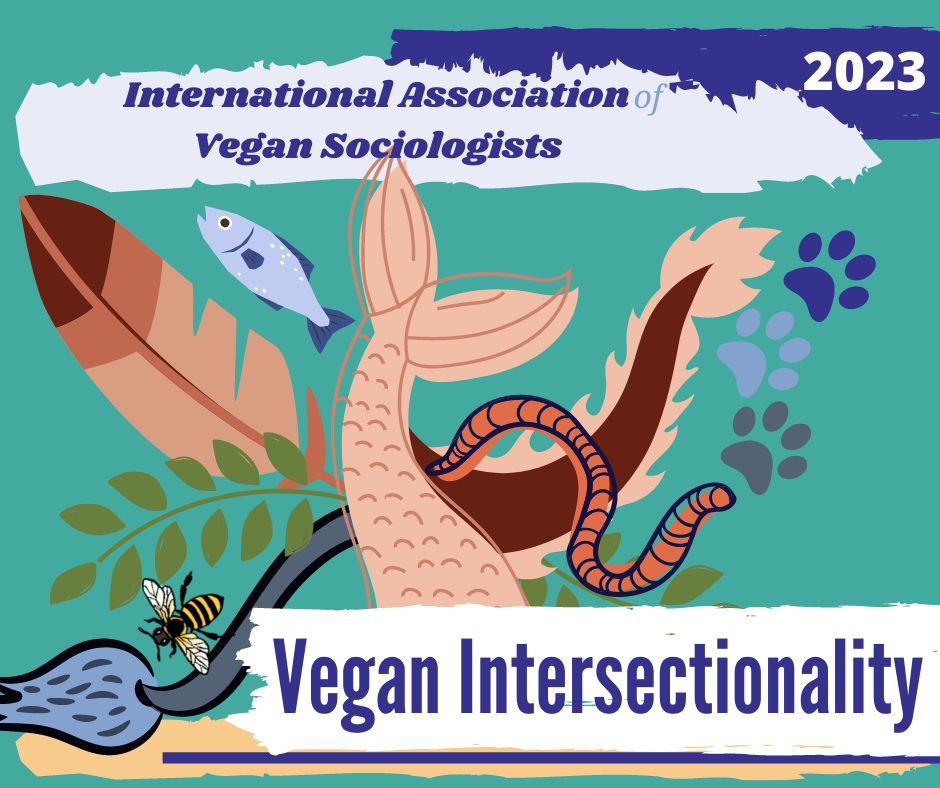4th Annual Meeting of the International Association of Vegan Sociologists

Date: October 7 & 8 2023
Location: Online
Mainstream theories of social inequality frequently compartmentalize experiences, but inequality rarely works that way in real life. Instead, individuals are comprised of many different identities at once, and these identities will interact with one another in unique ways. Furthermore, multiple systems and institutions are simultaneously at work in a given society. This schema is known as intersectionality, and it is a concept that emerges out of Black feminist thought.
In animal studies, vegan scholars employ this framework to argue that one’s life chances will be shaped, not just by one’s race, class, or gender, but also by their species. Vegan scholars also recognize the influence of an additional system….human supremacy. Historical constructions of race, class, gender, and other identities shape how animals are thought about and how they are treated. Sociologists interested in human justice, meanwhile, would benefit from recognizing how human oppression is always shaped by processes of species inequality.
Given that species, class, race, gender, and other identity categories are all historically constructed using similar mechanisms (such as animalization, objectification, sexualization, depersonalization, denaming, and so on), it is important to apply an intersectional perspective to achieve a more accurate understanding of oppression for nonhuman animals and humans alike. In the fourth annual meeting of the International Association of Vegan Sociologists, we take on this important task, one that is fundamental to vegan sociological theory.
IAVS Conference 2022 Lectures
Session 1: Australia
Nik Taylor and Heather Fraser
“Woman, Animal Care and Intersectional Feminism”
Marlies Bockstal
“‘Saving the Breeds’: An Intersectional Exploration of ‘Responsible’ Purebread Dog Breeding Practices in Aotearoa New Zealand”
Łucja Lange
“Unwanted Touch, or #MeToo for Nonhuman Animals”
Zoei Sutton and Alex Hill
“Multispecies Homemaking: A Web of Compelx Systemic Domination”
Session 2: Representation Politics
Louis Gough
“Undermining Anthropocentrism Through Vegan Discourse”
Olatz Aranceta-Reboredo
“Species, Values and Contradictions: Investigating Nonhuman Animal Portrayals in Basque Children’s Media on 3Kluba”
Gwendolyn Inocencio
“The Gaze Matters: The Rhetoric of Place as Protest in Ridley Scott’s Film BladeRunner”
Session 3: Vegan Feminism
Corey Wrenn
“Exploring Gender Nonconformity in Western Animal Rights Advocacy”
Kadri Aavik
“Intersectionality in Studying Veganism and Vegans”
IAVS Student Journal Session
Nathan Poirier
“Three Sociological Paradoxes of Eating Animals”
Session 4: Identity Politics
Laura Fernández
“Fat Veganism in Spain and Latin America”
Vahide Yasemin Özkorul
“Social Relations and Identity Intersections of Individuals Adopting Vegan Ethical Behaviour”
Ellie Atayee-Bennett
“Implicit Racism and Religious Exploitation in Vegan Activism?”
Session 5: Teaching Vegan Sociology
Matthew Cole
“Vegan Sociology and Public Education”
Kate Stewart
“So, You Want to Teach Vegan Sociology?”
Maira Ruiz Carreras
“Teaching Intersectionality in Communication”
Session 6: Looking Back, Looking Ahead
Nick Pendergrast
“Personal Reflections on Intersectionality in Practice”
Gabriela Oprea and Maria Martelli
“Collective Queer-Vegan Knowledges”
Josephine Browne
“After Liberation: Challenges in Fictional Explorations of Utopia and Intersectionality”
Patrycja Chuszez
“How Do We See Them? Film Images of Non-human Animals through the Eyes of Viewers”
Session 7: Gender Politics
Cameron Dunnett
“Masculinities in the UK Vegan Activist Movement”
Lauren-Marie Kennedy
“The Gendered Politics of Veganism”
Jane McElligott
“Intersectionality : The Pathway to Equity for Ethical Vegans and Nonhuman Animals”
Session 8: Practical Veganism
Corey Waters
“Strategic Harmonization: Veganism and Network Membership as Competing Priorities”
Chris Chudley and Bill Page
“Plant-based Universities Campaign”